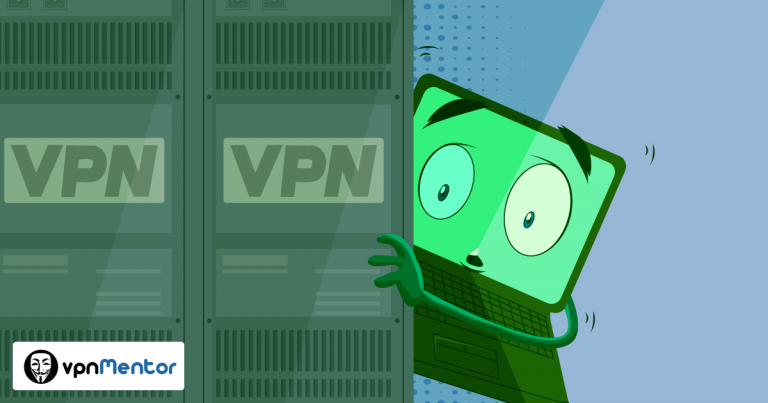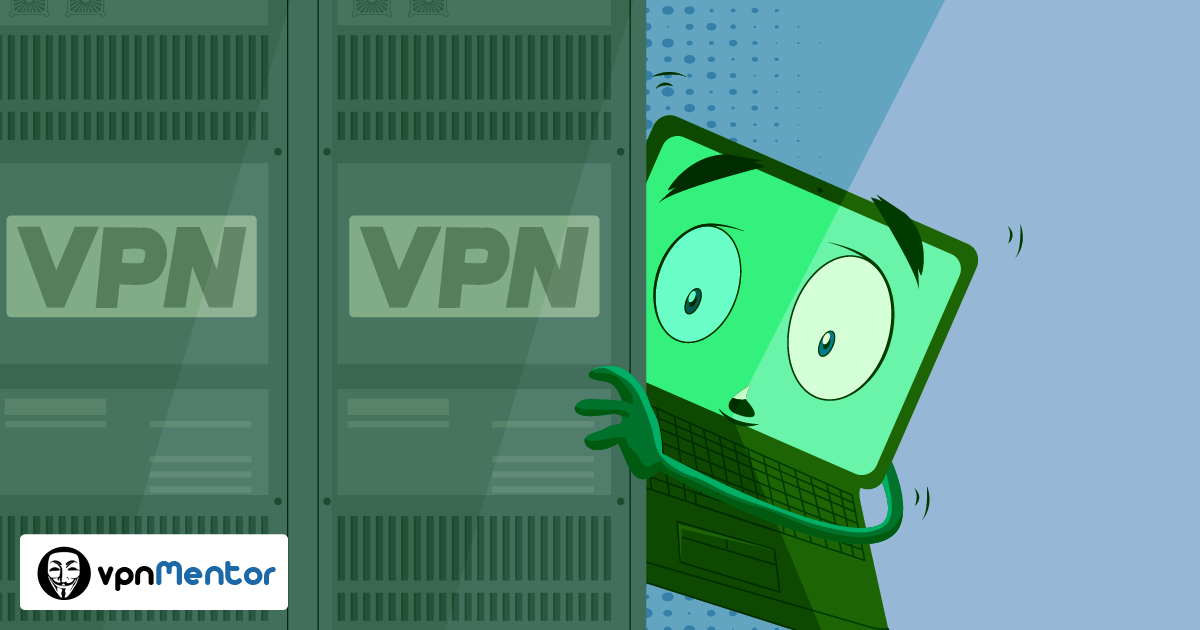
How to Hide Your IP Address in 2023 — 8 Ways, 7 Are Free
- Quick Guide: How to Hide Your IP Address With a VPN in 3 Easy Steps
- What’s an IP Address and Why Should I Hide It?
- 5 Best Ways to Hide Your IP Address in 2023
- Best VPNs to Hide Your IP From Anywhere in 2023
- ExpressVPN — Automatic Obfuscation to Beat Tough Firewalls and Change Your Location
- CyberGhost — NoSpy Servers Hide Your IP Address and Keep Your Connection Private
- Private Internet Access (PIA) — Hide Your IP Address With Customizable Security Options
- 4 Other (Not So Great) Ways to Change Your IP Address
- FAQs About Hiding Your IP Address
- Hide Your IP Address In Minutes
There are many ways to hide your IP address, but not all of them are safe or effective. Some put your privacy and security at greater risk, while others can considerably slow your speeds. To make your life easier, I tested several ways to hide your IP address and found 5 that work reliably. The key is to find a method that works best for your situation.
Of all 5 methods, the easiest and safest is to use a VPN. It’s a simple app that hides your IP address in 1 click. Plus, it encrypts your connection and doesn’t significantly slow your speeds, like some of the other methods do.
ExpressVPN is my top pick for hiding your IP address. It gives you a choice of IPs from 105 countries and can even disguise the fact that you’re using a VPN. It comes with a 30-day money-back guarantee, too, so you can hide your IP with ExpressVPN risk-free. If you’re not impressed, you can claim a full refund.
Hide Your IP With ExpressVPN >>
Quick Guide: How to Hide Your IP Address With a VPN in 3 Easy Steps
- Choose your IP changing method. I recommend the VPN method because it's the easiest and you can choose from thousands of IPs to mask your own. My top pick is ExpressVPN.
- Configure and run the software. Or, if you're not using IP-changing software, just connect to the new WiFi hotspot.
- Browse the web with a new IP. Once your connection is established, you’re free to browse the web with a different IP address, meaning yours is effectively masked.
What’s an IP Address and Why Should I Hide It?
An IP (Internet Protocol) address is a unique string of numbers and decimals that identify your device when you connect to the internet. It’s assigned to you by your internet service provider (ISP) and serves as your online identity, revealing information about your location and browsing habits. Here are some of the key benefits to hiding your IP address:
- Avoid government surveillance. In 5/9/14 Eyes countries, ISPs must track and store all user data for up to 2 years. By hiding your IP, you make it more difficult for your ISP to keep tabs on your internet usage. That doesn't give you a free pass to engage in illegal activities; rather, it provides a layer of privacy for lawful users who wish to avoid unnecessary surveillance.
- Privacy. Your ISP, search engines, and websites can use the information tied to your IP address to log your visit and track your online behavior, contributing to a profile they can sell to third parties. This data is often used for targeted advertising, which can be intrusive and annoying. Instead of leaving a digital footprint with every site you visit, you become anonymous.
- Protection against cybercriminals. Cybercriminals and hackers can use your IP address as a means to launch targeted attacks. That could range from hacking your accounts to even carrying out Distributed Denial of Service (DDoS) attacks if they deem you a worthy target. When you hide your IP, you reduce this risk significantly.
- Access geo-restricted content. Changing your IP address helps you bypass geographical restrictions on websites, apps, and other online services. A different IP address makes it appear like you’re in a different location, thereby unlocking content that’s available there. For instance, you can watch a region-restricted sports event, or access impartial news outlets if you’re in a country with oppressive censorship.
5 Best Ways to Hide Your IP Address in 2023
1. Use a VPN — The Easiest and Safest Way to Hide Your IP
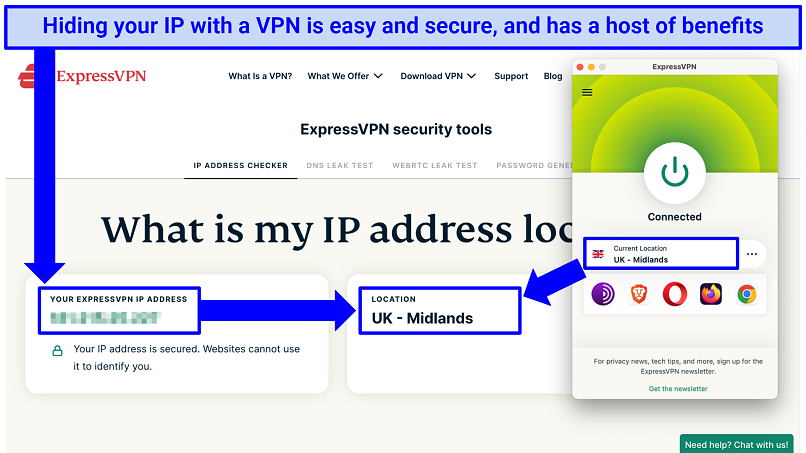 A VPN can change your location so you can buy cheaper flights and hotels, and access restricted content
A VPN can change your location so you can buy cheaper flights and hotels, and access restricted content
Cons: Good VPNs cost money, can slow your speeds slightly
A VPN is a popular and simple way to hide your IP address. It's an app that encrypts your internet traffic and routes it through a private server. The VPN server's IP address is used instead of your own until you disconnect from it.
Since VPN servers are usually spread out all over the world, you can pick and choose an IP address from many different countries. This allows you to access geo-restricted streaming services as well as apps, websites, and games that might not be available everywhere. It also makes it harder to trace your online activity back to you, such as torrenting.
Another benefit of a VPN is that it encrypts your connection so your online activity is secure. Basically, it adds a level of privacy to anything you do online. A solid VPN does this with a few different features. Firstly, by protecting you against DNS, IPv4/6, and WebRTC leaks so your IP address always stays hidden. Another useful feature is a kill switch, which cuts your internet connection if the VPN connection drops, so it doesn’t reveal your real IP.
All that being said, not every VPN is trustworthy, so it’s important to choose one that is. For example, it should adhere to a proven no-logs policy. While your IP is hidden using a VPN service, the VPN provider can still see your IP — a no-logs policy means your IP (or any identifiable information) is never kept by the VPN, so it can’t be shared.
Most VPNs are subscription-based, so you make a monthly or annual payment to use it. The amount is usually just a few dollars per month, making them very affordable. VPNs also tend to come with a money-back guarantee, which lets you use them for free for a limited time. That allows you to claim a full refund (usually within 30 days of purchase) if you’re not satisfied.
How to Hide Your IP With a VPN in 3 Easy Steps
- Download a VPN. My favorite is ExpressVPN because you can choose IPs in 3,000 countries to effectively hide your own. It also comes with a 30-day money-back guarantee.
- Choose a server. They are organized by location.
- Connect to the server. Usually, just clicking on the server location will automatically connect you to your new IP, so you’re good to go in 1 click.
2. Connect to a Proxy Server — Good for Bypassing Geoblocks, but Not Super Safe
 Proxy servers can bypass geoblocks but lack security features
Proxy servers can bypass geoblocks but lack security features
Cons: Lacks security and privacy features, overcrowded servers that can have slow speeds, only hides your IP in your browser
Similar to a VPN, SSL, SSH, or SOCKS, proxy servers hide your IP address by sitting between your device and the sites you visit. So when you visit a website, it sees your proxy server's IP address instead of your own. A decent proxy service lets you choose from several different server locations, and they tend to be popular because they’re usually free. Another type of proxy is an IP scrambler, which gives you a different IP with every connection.
But where a proxy server falls short is its lack of security and privacy features. Since they don’t encrypt your connection and don't cover DNS traffic, unwanted third parties can still see your online activity and collect data about you. They're also more susceptible to man-in-the-middle attacks because they lack authentication that VPNs have.
I also experienced slow speeds when using hide.me’s proxy because the server was most likely overcrowded. This is very common with free services since they don’t have enough funds to offer global networks. And since they’re application-specific, they will only hide your IP in your browser, unlike a VPN that hides it across all apps.
How to Hide Your IP With a Proxy in 3 Easy Steps
- Choose a proxy server. I recommend hide.me.
- Go to your proxy server’s website. Then, enter the URL of the site you want to access in the proxy server entry form, choose a location (if available), and press “Enter” to load the page.
- Enjoy your new IP address. You’ll use the website in the same browser window, but using the IP of the proxy server.
3. Use the Tor Browser — Multiple Layers of Encryption, but Very Slow Speeds
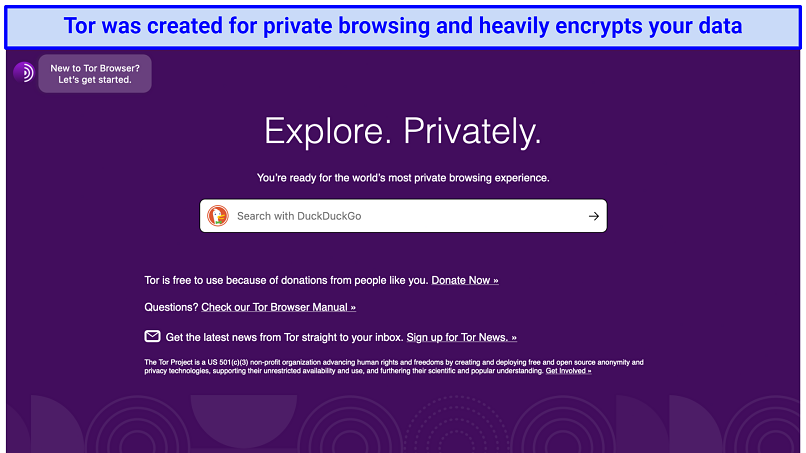 You can use Tor to access regular clear web pages as well as the hidden dark web
You can use Tor to access regular clear web pages as well as the hidden dark web
Cons: Very slow speeds, can’t bypass geoblocks, only encrypts browser traffic, unavailable on iOS, associated with criminal activity
Tor (The Onion Router) browser sends your internet traffic through a volunteer-run network. It encrypts your traffic by sending it through multiple servers called “nodes”, which add extra layers of encryption. The layers are like an onion, hence the name. Websites can only see the IP of the last server you use, so it hides your IP address.
Even though the Tor Browser is free, a big drawback is that its encryption layers significantly slow you down. It took me a little over 10 seconds to load a basic webpage, while activities like streaming and downloading became a chore.
Another issue is its association with criminal activity since it’s the main portal to access the dark web. Plus, your internet service provider (ISP) can detect the use of Tor, although it won't be able to see your browsing.
But that can be a disadvantage; if your browsing is perfectly innocent, your ISP and government agencies may suspect you’re engaging in illegal activities. So to use Tor safely, it’s recommended to use a VPN anyway to hide your use of the browser.
How to Hide Your IP With Tor in 3 Easy Steps
- Download the Tor browser. Go to the Tor website and download the installation file for your device.
- Install the Tor browser. Click on the download file and follow the installation instructions.
- Enjoy secure browsing with a new IP. Open the Tor browser and use it like your regular browser, knowing your real IP address is hidden.
4. Create a Hotspot on Your Smartphone — A Readily Available Solution, but Can Cost Money
Cons: Can’t bypass geoblocks, doesn’t change your virtual location, no privacy or security measures, uses data that can cost money
If your actual IP is compromised, or you don’t want to use it temporarily, then using a hotspot on your smartphone is easy to set up and can work well. I just needed to go to my phone settings to enable my hotspot and then connect my laptop to it, which took me a little over a minute.
While this method changes your IP address, there are 3 downsides. Firstly, your mobile carrier can see all of your online activity, so it’s not private. Secondly, you can’t bypass geoblocks because your online location won’t change. And lastly, it can quickly chew up your mobile data and can become costly. One way of keeping tabs on your data usage is with a prepaid (pay-as-you-go) SIM card.
How to Hide Your IP With a Mobile Hotspot in 3 Easy Steps
- Turn on your personal hotspot. Go to your phone settings, turn off your WiFi, and enable your personal hotspot.
- Connect your device. Locate the hotspot on your primary device and connect to it.
- Enjoy your new IP address. Use your smartphone data to browse the internet with the IP assigned by your mobile carrier.
5. Use Public WiFi — Mostly Free to Use, But Leaves Your Connection Vulnerable
Cons: Can’t bypass geoblocks, doesn’t change your virtual location, no privacy or security measures, uses data that can cost money
Changing your WiFi network can hide your real IP address — even if you switch to a public network. If you can’t access a website or service and have public WiFi access, then this option can be a short-term fix.
But it’s not the safest option because public WiFi networks are an easy target for hackers. Since these networks lack encryption and authentication, cybercriminals can use them to easily obtain sensitive data, such as passwords and credit card details. Other issues include slow speeds due to overcrowding and blocking certain media such as video.
Best VPNs to Hide Your IP From Anywhere in 2023
1. ExpressVPN — Automatic Obfuscation to Beat Tough Firewalls and Change Your Location

Tested November 2023
| Best Feature | Safe to use anywhere, even in countries with strict internet censorship |
| Server Network | 3,000 servers in 105 countries |
| Speeds | Extremely fast |
| Can Access | Netflix, Disney+, Amazon Prime Video, BBC iPlayer, Hulu, SkyTV, (HBO) Max, DAZN, Peacock TV, ESPN |
ExpressVPN doesn’t just hide your IP — it can also hide your use of VPN. Deep packet inspection (DPI) is a cutting-edge form of blocking that can identify VPN metadata. Schools, workplaces, public networks, and even whole countries like China use DPI. When ExpressVPN detects it, it scrambles your data further to evade detection.
RAM-based servers automatically wipe all user data on reboot. Plus, leak protection ensures your actual IP address isn't exposed. I tested 5 US and 4 UK servers, and there were no IP, DNS, or WebRTC leaks, so my real IP address was always hidden. In addition, the kill switch keeps you safe even if the VPN connection drops.
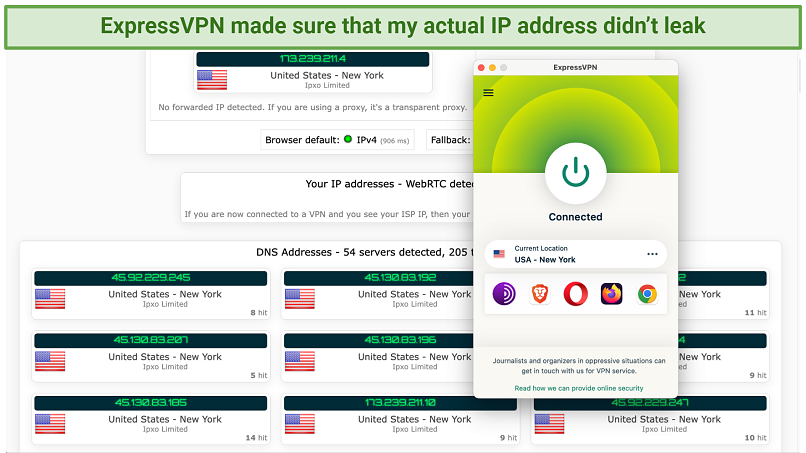 A single ExpressVPN account lets you hide your IP on up to 8 devices
A single ExpressVPN account lets you hide your IP on up to 8 devices
ExpressVPN also has really impressive speeds. Usually a VPN will slow your base internet speed a bit because of the encryption (10 to 20% is normal) and you’ll experience bigger drops the farther away the server is. I didn’t have speed drops of more than 9% while using ExpressVPN’s US servers — even on ones more than 8,000KM from my real location.
It isn’t the cheapest service, but you can save big with a long-term plan. Best of all, you can try it risk-free with a 30-day money-back guarantee. If you’re not happy, it’s easy to get your money back. I tested this myself using 24/7 live chat. After answering a quick question on user satisfaction, my request was approved, and I got my money back 3 days later.
Useful Features
- No-logs policy. Some VPNs track users’ IP addresses, browsing data, and other personal information. ExpressVPN’s strict no-logs policy has been fully audited and court-proven on multiple occasions, so you can be sure your data remains private.
- IP Address Checker. Once you connect to a server, you can check your new IP address and see its location on a map.
- Proprietary Lightway protocol. Most VPNs use standard open-source protocols like WireGuard and OpenVPN, but ExpressVPN has built its exclusive Lightway from the ground up. It uses around 4 times less code than WireGuard, meaning your connections are lightweight, fast, and highly secure.
- Threat Manager. Hiding your IP is great for privacy, but you’re still vulnerable to malware and viruses. ExpressVPN continuously updates its blocklist of dangerous sites and files to help keep your devices free of threats.
Hide Your IP With ExpressVPN >>
2. CyberGhost — NoSpy Servers Hide Your IP Address and Keep Your Connection Private
| Best Feature | Privately managed servers keep your IP and data hidden |
| Server Network | 9,561 servers in 100 countries |
| Speeds | Very fast |
| Can Access | Netflix, Disney+, Amazon Prime Video, BBC iPlayer, Hulu, SkyTV, (HBO) Max, DAZN, Peacock TV, ESPN |
Highly secure NoSpy servers are kept in CyberGhost’s private data center and provide extra security since only its staff can access them. Many VPNs store servers in shared facilities, posing the risk of third-party interference, but that’s not possible with NoSpy servers.
Further, its HQ is in Romania, outside of the 5/9/14 Eyes alliance, so it is under no obligation to share any data with government agencies.
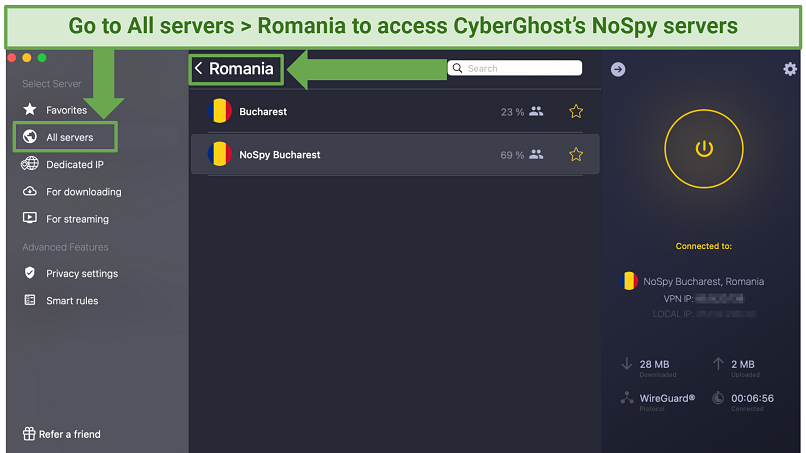 NoSpy servers were 24% slower than CyberGhost’s regular location in Bucharest, but worth the extra privacy
NoSpy servers were 24% slower than CyberGhost’s regular location in Bucharest, but worth the extra privacy
Its quick connections ensure a seamless online experience free of interruptions. In my tests of its US server speeds, I observed only a 16% drop in my download speed. While it may not be as swift as ExpressVPN, it's still remarkable. The speed was ample for streaming The Out-Laws on Netflix in Ultra High Definition without buffering or lag.
CyberGhost provides its users with special streaming servers that are tailored for specific regions and platforms. For instance, its server for Disney Plus US provides a US IP address and easy access to the streaming platform. CyberGhost constantly keeps these servers updated to prevent them from being blocked, and also offers servers for P2P downloading.
The long-term plans come with a generous 45-day money-back guarantee. That way, you can test CyberGhost risk-free and run as many leak tests as you like, so you know it’s legit.
Useful Features
- Built-in leak protection and kill switch. You don’t even have to activate CyberGhost’s kill switch and leak protection because they’re automatic. They will keep your IP address hidden from your very first connection — it proved effective as my tests turned up zero leaks.
- Dedicated IPs. Do you want your own personal IP that no one else can use? CyberGhost can give you that for a small additional fee. I found them a little faster than the regular servers since no one else can use them, plus you don’t have to fill out any CAPTCHA tests (a minor drawback with using a VPN).
- Block content. CyberGhost’s malware blocker stops dangerous files at DNS level, so they never even reach your devices. Along with hiding your IP, it’s an excellent combination for private and secure browsing.
- Supports 7 devices. I didn’t have to log out of any devices when testing CyberGhost since it supports multiple connections.
Hide Your IP With CyberGhost >>
3. Private Internet Access (PIA) — Hide Your IP Address With Customizable Security Options
| Best Feature | A host of adjustable security features to balance privacy and speed |
| Server Network | 29,650 servers in 91 countries |
| Speeds | Very fast |
| Can Access | Netflix, Disney+, Amazon Prime Video, BBC iPlayer, Hulu, SkyTV, (HBO) Max, DAZN, Peacock TV, ESPN |
PIA has robust, customizable security features that keep you safe while hiding your IP address. You can choose between AES 128 or 256-bit encryption, so you can streamline your connection however you want. AES 128-bit offers faster speeds with less encryption, while 256-bit is more secure but slightly slower.
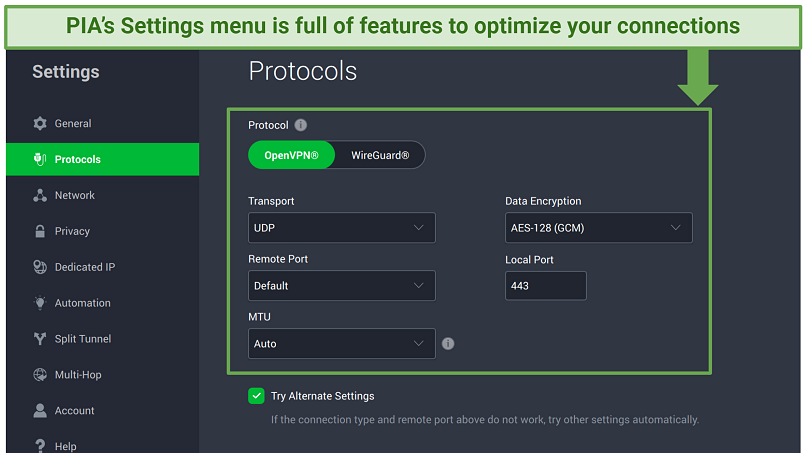 PIA lets you choose between UDP connections (generally faster) or TCP (can be more reliable on unstable networks)
PIA lets you choose between UDP connections (generally faster) or TCP (can be more reliable on unstable networks)
Multi-Hop sends your data through the VPN and a proxy server, so you can double up on hiding your IP. You can choose between a SOCKS5 or Shadowsocks proxy, which can be in a different country to your VPN location if you prefer. It was around 17% slower than PIA’s regular VPN connection, which isn’t bad for such a feature.
At first, I was hesitant about PIA because it's based in the US, which is a key member of the 14 Eyes Alliance. Yet, PIA's no-logs policy stands legally tested, as the firm has never handed over any data to authorities, mainly since it has no records to share.
You can test PIA without risk with its 30-day money-back guarantee. Techies like me will love PIA’s vast array of settings, but if you find them a little overwhelming, you can easily claim a refund.
Useful Features
- Unlimited devices. Change IPs on an entire household of devices with PIA’s unlimited connections.
- A great choice for the US. PIA is the only VPN on my list with servers in every US state. That’s ideal for beating regional sports blackouts, where a regional IP is sometimes necessary.
- Fast speeds. I tested local servers in France, Germany, and the UK and found an average dropoff of just 7% from my base. I got a 52% slowdown from Toyko though, so it’s not the best choice if you want to access faraway locations.
- Solid security. Like most reliable premium VPNs, PIA gives you DNS and WebRTC leak protection, a kill switch, and connection automation.
4 Other (Not So Great) Ways to Change Your IP Address
1. Unplug Your Modem
While it may sound silly and obvious, unplugging your modem can sometimes change your IP address. Whenever you disconnect from your ISP, the link with your current IP address gets deleted. Therefore, re-establishing your ISP connection can give you a new IP address. This will only work if your ISP uses dynamic IP addresses, which is common.
The key to this approach is to keep your modem disconnected for an extended period. However, this method is generally unreliable as it often fails to work, so it shouldn't be your go-to solution. Additionally, this technique offers no security or privacy safeguards, and your Internet Service Provider can still monitor your online activities. Furthermore, because you can't alter your geographical location, circumventing geoblocks isn't possible either.
2. Use a NAT Firewall
A NAT (National Address Translation) firewall lets different devices on the same network use the same public IP address — this only hides the devices’ private IP address. It takes requests from the private IP address of each device and forwards them all through your public IP address before reaching the online destination.
To summarize, a NAT firewall does not conceal your IP address. Although it does shield your devices by concealing their private IP addresses, your actual location and online activities remain visible since your public IP is not concealed.
3. Get Your ISP to Change it For You
All you have to do here is contact your ISP directly and ask them to change your IP address. Just make sure you have all your account information handy. But keep in mind that most ISPs use dynamic IP addresses, which means you won’t always use your new one. If you want to continue using the same IP address, then ask for a static IP address.
Furthermore, it's important to note that this approach solely assigns you a new IP address without offering any additional security measures or bypassing geoblocks. In addition, your ISP retains the ability to monitor your online behavior and gather data about you, meaning that this method compromises your privacy.
4. Renew Your Private IP
Your devices use private IP addresses to communicate with each other. Connecting to the internet via a WiFi router or ethernet cable gives you a public IP address and private IP addresses for your network devices. But it will only hide the private IP address of your devices, not your public IP, so it won’t hide your browsing or location. However, you can do it easily in a few simple steps.
On Windows
- Search for Command Prompt. You’ll find it in the Windows menu on the left of the taskbar.
- Right-click to “Run as administrator”. This will open the Command Prompt box.
- Enter “ipconfig /release”, then Enter. This releases your current IP address.
- Enter “ipconfig /renew”, then Enter. This gives you a new IP address.
On macOS
- Open System Preferences. You’ll find it in the Apple Menu.
- Go to Network. In the left pane, go to the network you're connected to.
- Click Advanced. Select the TCP/IP tab.
- Click Renew DHCP Lease. This gives you a new IP address.
Hide Your IP With ExpressVPN >>
FAQs About Hiding Your IP Address
Is it legal to hide my IP address?
Yes, it is generally legal to hide your IP address. However, the activities you engage in while your IP address is hidden could potentially be illegal. For instance, downloading copyrighted material or engaging in illicit online activities is still unlawful regardless of whether your IP is hidden or not. But using a VPN to mask your IP address or a proxy server isn't against the law in most countries.
Should I hide my IP address while torrenting?
It is advisable to hide your IP address while torrenting. When you use a torrenting client, your IP address is typically visible to all the participants in the same torrent swarm. By hiding your IP, you make it more difficult for third parties to track your activities and potentially misuse your information. Bear in mind, however, that hiding your IP doesn't give you a free pass to download copyrighted content.
Can I hide my IP address on iPhone and Android?
Yes, you can hide your IP address on mobile devices. Some IP-hiding methods only work with certain operating systems and devices, though. So make sure you choose a method that works for the devices you want to protect. Reputable VPNs offer easy-to-install apps for Android and iOS. For example, proxies only work within a browser and Tor only hides your IP within the Tor network.
How can I check if my IP is really hidden?
First, choose your method and hide your IP, then, you can use an online tool to ensure it’s effectively hidden. Here's how:
- PC and macOS: Open your web browser and visit an IP checker website. It will display your current IP address.
- Android and iOS: Use similar websites or install apps specifically for checking IPs.
- Linux: Open a terminal and use the “curl” command to check your IP. Type “curl ifconfig.me” and press enter. If the IP displayed is different from your real IP, your IP is hidden.
Can I hide my IP from my ISP?
Hiding your IP address from your ISP isn’t possible. If you use a VPN, your internet traffic is redirected through the VPN’s private server, so your ISP can't see the websites you visit or the data you send and receive. But it can still see your original IP, while the sites you visit can’t.
Does Incognito Mode hide my IP address?
No, using Incognito Mode does not hide your IP address. This mode mainly prevents the storing of browsing history, cookies, and site data. Your IP address remains visible to websites, network administrators, and potential hackers. To truly hide your IP address, consider using a VPN or a proxy server.
Can I hide my IP for free?
Yes, it’s possible to hide your IP for free, but these methods have big disadvantages. A proxy server is easy to use and is good for bypassing geo-blocks because you can choose one based on its geographical location. However, proxies lack security and privacy features and since so many people use them, they can suffer from overcrowding and slow speeds.
Because it has many layers of encryption, Tor browser is recommended for safety and privacy. But it’s always really slow as a result, making it unsuitable for streaming and downloading. You also can’t choose your new IP address without a lot of complicated configurations.
There are free VPNs out there, but I don’t recommend them because most have annoying data and speed limitations. Plus, many free VPNs openly admit to tracking user data and selling it to third parties, and some are even full of malware. A top-quality VPN is the easiest, safest way to hide your IP without noticeably slowing your speeds, and only costs a small monthly fee.
Hide Your IP Address In Minutes
It’s important to choose a reliable method for hiding your IP address, as some are more risky and unreliable than others. In particular, you don’t want to use a technique that makes your data visible to unwanted third parties or significantly slows your internet speeds.
Therefore, I tested a number of ways for hiding IPs so I could present those that work well. All of them have different features, which means some are better suited for certain situations than others.
My favorite method for hiding IPs is a VPN. A VPN like ExpressVPN is easy to use and has fast speeds, and can even disguise your use of a VPN. Plus, it has a 30-day money-back guarantee, so you can try ExpressVPN without risk. If you find it’s not for you, then you can claim a full refund.
To summarize, these are the best VPNs to Hide Your IP Address...
Your data is exposed to the websites you visit!
Your IP Address:
Your Location:
Your Internet Provider:
The information above can be used to track you, target you for ads, and monitor what you do online.
VPNs can help you hide this information from websites so that you are protected at all times. We recommend ExpressVPN — the #1 VPN out of over 350 providers we've tested. It has military-grade encryption and privacy features that will ensure your digital security, plus — it's currently offering 49% off.




